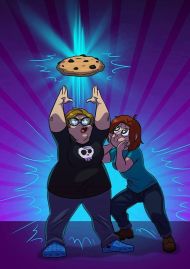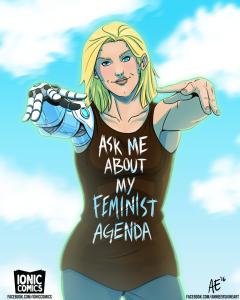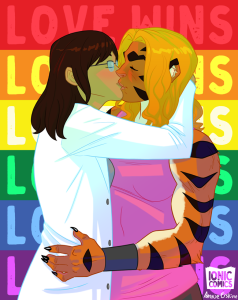By Christine DiMeo
Pinned to the door of the sculpture studio in Western Kentucky University’s Fine Arts Center, a wide horizontal flier depicting a cloud of muscled, mostly female superheroes gazing triumphantly into the sky flaps its corners at the warm spring breeze every time the nearby exterior door opens.
Blocky letters at the bottom of the paper announce a lecture by a visiting artist: “Annie Erskine: Ionic Comics.”
Though the event happened over a year ago, in March 2017, the flier is still pinned on top of every newer event, loudly displaying a host of the strong female and LGBTQ+ characters Erskine is known for. She said these characters are voices for these underrepresented communities.
“We need more stories out there by voices who might not be able to be heard otherwise,” she said. “I hope some day I can help with that!”
An independent comic artist, Erskine is the founder of Ionic Comics, where she works with other artists and writers to produce female- and LGBTQ+-centric art and stories online. Her distinct style is a combination of classic comic book art with a twist of diverse, modern characters.
Among those close to her, she is known for her individuality and gritty determination – determination that kept her true to her unique voice from her childhood to her career in art.
A Seemingly Ordinary Origin Story

Courtesy of Annie Erskine.
“According to my mother, I’ve been drawing since I could hold a pencil,” Erskine said in an email.
The level of details she included in her childhood drawings, such as adding fingers on her characters, led her parents to believe she had the talent to become a professional, she said.
Her mother, Sebrina Erskine, said her daughter began drawing in a cartoon and comic style from a young age, as well.
“She would do one picture and draw a square around it, and another one and do them sequentially,” she said. “She has been doing that her whole life.”
Born and raised in Bowling Green, Kentucky, Annie Erskine said she always had aspirations to be an artist when she was older. It wasn’t until high school, she said, that she began seriously considering the career, working for her school newspaper, where she learned about the unique role of online creators.
“My mom, who has always been very business-oriented, was the one who kind of trained me to aim my love of art in a direction that would make a career for me in the long-run,” Erskine said.
Getting an education was the first step in this training.
Erskine began studying graphic design at WKU in 2007, at the same time taking on the position of cartoonist at the school’s newspaper, the College Heights Herald.
In her classes, her determined nature showed early, her professors said.
Joon Sung, a professor of Computer Animation and Digital Media, said in an email that although the Computer Animation minor did not exist when Erskine studied at WKU, she was determine to follow an animation path.
“Unlike many students who were not sure which field to pursue, Annie had made clear to us all that her goal was to do animation,” he said.
Michael Nichols, who taught Erskine in illustration, said in an email that she stood out not only in her talent, but in how distinctly she knew her own potential and passion in the field of cartooning and illustration.
“It was obvious to me from the beginning that Annie was far beyond her peers,” he said. He said he still has a digitized version of a drawing she made of a Toy Alien from Toy Story that he shows to students for inspiration.
Jeff Jensen, a former graphic design professor of hers, now retired, said Erskine’s particular style of illustration stood out from what the university’s art department typically teaches. She began displaying her distinct comic book style early, he said.
“We kind of try to push them away from that and try to get into more the fine arts side, but Annie wasn’t going to have anything to do with that.” he said. “That’s Annie, she’s going to do what she wants to do.”
At the same time, he said the one thing she struggled with was doing the mundane, daily exercises that professors assigned to gradually improve her skill. While he said she knew the work was important, she was very focused on becoming an illustrator.
Still, Erskine said she also took on graphic design work for local businesses and class projects as a way to spread her name. One project was redesigning the logo for Hilligan’s Sports Bar near WKU’s campus.
During another project, Jensen said he learned more from Erskine than she likely learned from him. The project was to design a new logo for Paradise Point, a property her mother calls a “funky-junk dive-diner-antiques store” that the family owns.
Jensen said she used primarily illustration in the logo, challenging his idea of “what a logo could be.” He said it put him out of his comfort zone to abandon the more rigid style he was used to teaching.
Many students teach him by taking him out of his comfort zone, but it was different with Erskine, he said.
“[Other students] will fight you on something, and when they fight you on it they really don’t have anything to back it up except they like it,” he said. “Annie had something to back it up because Annie was good at what she did.”

Courtesy of Annie Erskine.
A Bright Opportunity and a Darkest Hour
As a junior in 2010, Erskine said her mother encouraged her to apply for internships to get real-world experience.
“She said to apply for the place I wanted to work the most at first and then go down the list from there,” she said. “So I applied for places like Nickelodeon, Cartoon Network, Mad Magazine, DC Comics, Marvel Comics, and then local places as well.”
She said Mad Magazine, a comic book-influenced humor magazine, was the first to give her an offer, but the position would have required her to move to New York for no pay, so she had to decline.
She said she had given up on internships after that point, until she received a call that December from Cartoon Network. Following a shaky phone interview, she said she was sure she had botched the deal. Instead, the company gave her two weeks to pack up and move to Atlanta.
Blaine Marowitz, international manager and one of Erskine’s former bosses at Cartoon Network, said Erskine really stood out to the company because of her artistic versatility and passion for her work.
“I would say she was probably one of the most enthusiastic interns that we’ve ever had join the team, and just her knowledge of the brand was something we took note of,” she said.
Erskine worked largely on graphic design projects for the company’s mobile games, and was skilled at adjusting her style to work with the varying projects that crossed her plate, Marowitz said. She said the company was so impressed with Erskine’s love for Cartoon Network that her internship was extended until August of 2011.
“I really can’t say enough good things about her,” Marowitz said.

Courtesy of Annie Erskine.
As an intern at Cartoon Network, Erskine said she learned valuable skills, like working on a team and following a strict schedule, or maximizing her efficiency with digital tools. However, she said she also learned animation was not her ideal career field. Knowing she still wanted to be a visual storyteller, she took to the internet and started her first original webcomic series, titled Magia High.
Near the end of her internship, Erskine took a bold step and founded Ionic Comics, an independent comic company with Magia High as its flagship series.
In August, she returned to WKU to resume her studies, graduating in spring of 2012. During these last two semesters, she reconnected with fellow art student and former high school classmate Joy Hurt, and the two later started dating.
After graduating, Erskine continued to work on her comic, do freelance work for Cartoon Network and make connections with other artists. She married Hurt in 2014.
But the uphill climb became a downward spiral when Magia High abruptly came to an end.
Personal reasons she declined to specify made her unable to continue the series, leaving her with feelings of guilt and failure, she said.
“It put me in a really deep depression for a while because I really felt like I let a lot of people down and was a failure,” she said. “People still occasionally ask me when the next issue will come out or why I stopped working on it.”
This time of self-doubt and depression led her to a revelation that changed her career and started the flame for her proudest creation.
“During one of my darker days, my wife asked me what story I really wanted to tell,” she said. “I went back to my roots and thought about what I really loved and what got me into storytelling in the first place. It was always superheroes.”
A Hero Emerges
“I’d had a story and characters in my brain since I was 16 but I was always too scared to explore the ideas further,” Erskine said.
She said professionals with experience in the comic world had told her “girls can’t do superheroes” or that the genre was too mainstream and “doing superhero stories is selling out.”
“But with encouragement from my wife, I decided it was time to tell this story,” she said.
With the idea in mind to create a superhero comic that represented women and LGBTQ+ characters, Erskine contacted her friend and fellow creator Clint Waters. She said she invited Waters on board Ionic Comics to write the script for the new comic, and the two spent several months getting to know the story and characters.
The first page of Variants went online in early January 2017.

Variants: Stripes follows a covert military agent and former superhero with tiger-like abilities that make her a “variant,” or super-powered individual. The comic features a strong female and LGBTQ lead alongside a nostalgic, old-school comic book feel.
Kristina Arnold, gallery director and art professor at WKU who said she worked with Erskine after her graduation, said in an email she feels Erskine “blossomed” by developing a distinct voice through her female and LGBTQ+ characters.
“Having strong women (literally strong, these characters aren’t your typical superhero femmes with tiny clothes and stilettos) represented in comics…is an important powerful image that we typically still don’t see in comics and magazine images of women,” Arnold said.
Jensen said this distinct voice set her apart in his classes. While others largely copied the ideas and styles of professional artists, he said Erskine spent time differentiating herself.
“She learned how to develop her own characters, and then over the years, how she’s developed that into a purpose or a reason for doing it,” he said. “And I think that’s great. That’s what artists need to do.”
However, not all creators and readers approve of the messages in her work, she said.
As a female and pansexual creator, she said she receives backlash for publicly promoting her work, both passive-aggressive and direct antagonism.
“Sometimes when Clint will mention I am the founder of the company and the lead artist, men will act shocked or question it like ‘you did this? You?’,” she said.
She said she feels a lot of male comic creators regard her as an amateur because she is female in a primarily male-dominated industry. Sometimes ordinary people with no experience in comics talk down to her as well, she said.
“Like, I’m sitting there at a booth at Dragon Con next to famous artists, my comic laying on the table in front of them, and they’re trying to explain how it all works,” she said.

Art of a cyborg character from Variants: Stripes.
On the internet, she said the backlash can take a directly malevolent shape.
“Online it can be a lot worse because for a lot of people on the internet, there’s a disconnect from basic human empathy,” she said.
She said she has been targeted or seen others targeted in online creator groups for calling out content they feel is sexist or for having LGBTQ+ characters. In addition to receiving nasty comments or direct messages, she said she has seen female and LGBTQ+ creators have their personal information released to the public as a form of sabotage by artists and readers who disapprove of their work.
To minimize the risk of being attacked, she said she stopped regularly participating in online creator groups.
“It was just mentally exhausting fighting all the time, y’know?” she said.
Instead, she said she relies on support networks of other feminist and LGBTQ+ creators and highlighting benevolent artists through promotion and financial support.
“We lean on each other for strength,” she said.
Like one of her heroes, she said she also responds to the hate by working harder.
“Another thing I do is just keep on creating as much as I can,” she said. “To keep pushing my stories out there and showing that I will not quit.”

Courtesy of Annie Erskine.
Variants: Stripes is currently on hiatus as Erskine and her wife go through the process of selling their Scottsville, Kentucky, house and relocating to Washington state. There, she said her short-term goal is to continue the comic and eventually sell it in printed books.
As for the long term, she said she wants to adopt children, make enough money to support her family entirely on her comic work, and grow Ionic Comics to the point where it can be something of a haven for young, rising comic artists.
Meanwhile, she gives advice and lectures to aspiring artists at her alma mater.
Arnold said she teaches classes in the sculpture room where Erskine’s artist talk flyer hangs and finds it encouraging to see the image.
“I think as artists we often send our work out into the world and then don’t know if anyone ever sees it, or if it has an impact on anyone,” she said. “I enjoy this image of Annie’s every time I pass it – and feel connected to her and her created worlds because of it.”